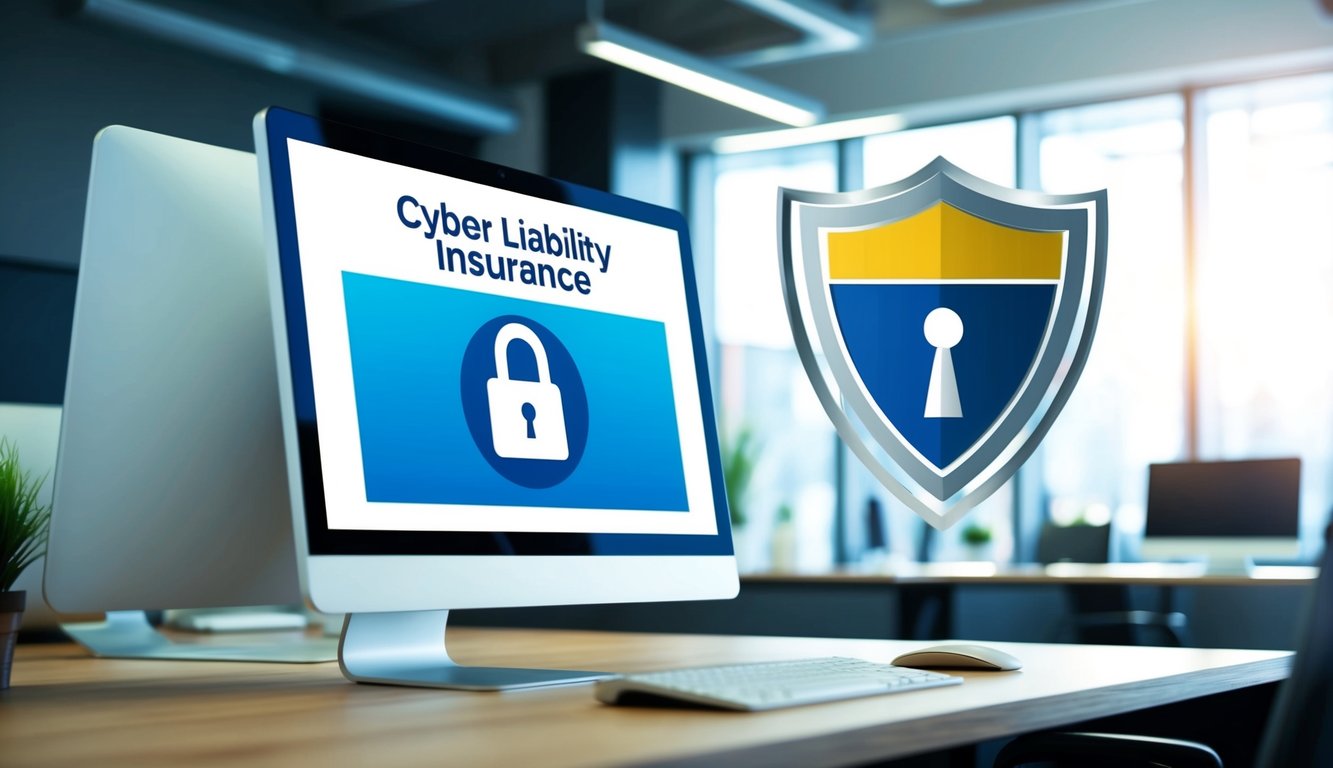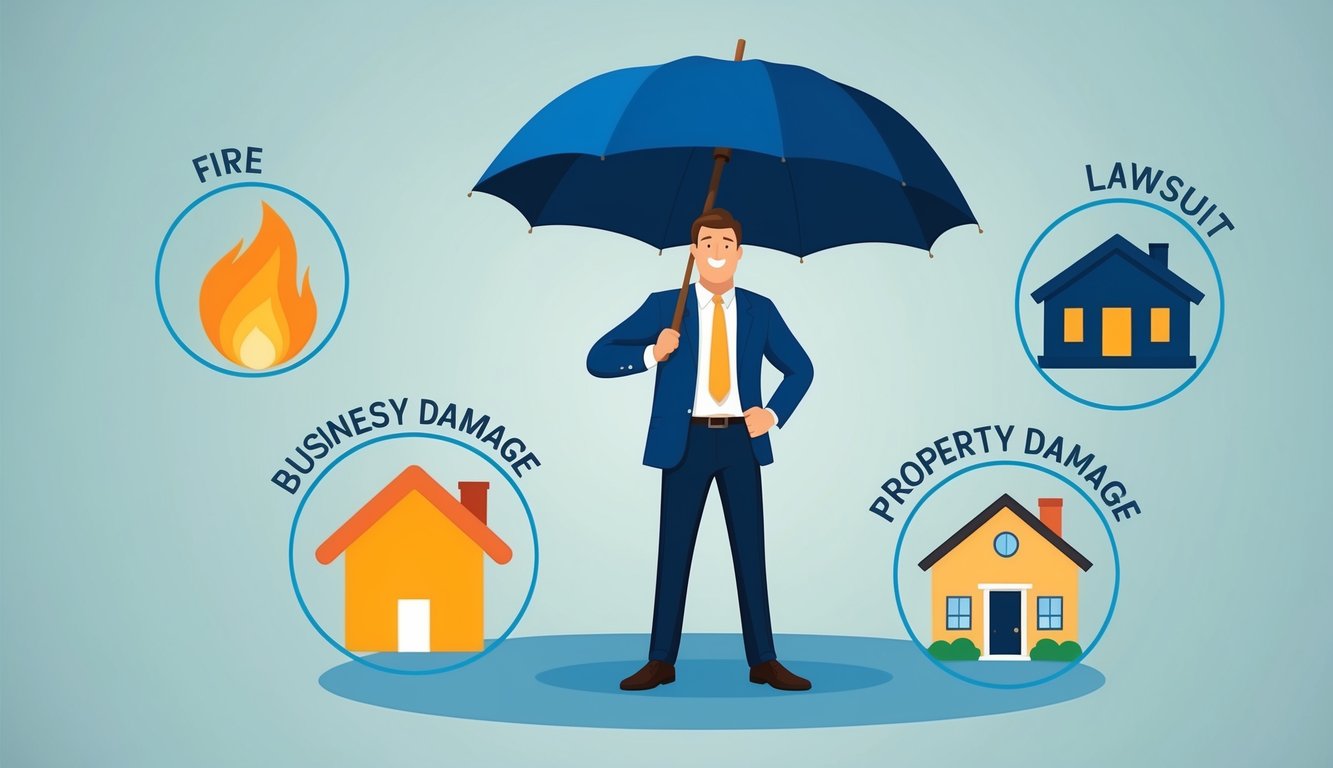Protecting your business from potential legal and financial risks is crucial for long-term success.
Liability insurance plays a vital role in safeguarding your company’s assets and reputation.
By understanding the different types of coverage available, you can make informed decisions to shield your business from unforeseen circumstances.
Choosing the right liability insurance can mean the difference between your business thriving or facing devastating losses. It’s essential to assess your specific needs and potential risks to ensure adequate protection.
From general liability to professional liability and product liability insurance, each type of coverage serves a unique purpose in defending your business against various claims and lawsuits.
1) Understand General Liability Coverage
General liability insurance is a crucial component of protecting your business.
This type of coverage safeguards your company against third-party claims for bodily injury, property damage, and advertising injury.
When a customer visits your premises, general liability insurance can protect you if they suffer an accident.
For example, if someone slips and falls in your store, your policy may cover their medical bills.
Property damage is another key aspect of this coverage.
If your business operations accidentally damage someone else’s property, your general liability policy can help cover the costs.
Advertising injury protection is also included in most general liability policies.
This covers issues like copyright infringement or slander that may arise from your marketing efforts.
Keep in mind that general liability insurance doesn’t cover everything.
Employee injuries, for instance, fall under workers’ compensation insurance.
When considering general liability insurance, assess the risks associated with your specific business operations.
This will help you determine the appropriate level of coverage you need.
To obtain general liability insurance, you’ll need to shop around and gather quotes from several providers.
Compare coverage options and costs to find the best fit for your business.
Remember, having adequate general liability coverage can provide peace of mind and financial protection for your business in case of unexpected incidents.
2) Evaluate Professional Liability Insurance
Professional liability insurance, also known as errors and omissions insurance, is crucial for businesses providing professional services.
This coverage protects you from claims of negligence, mistakes, or failure to perform.
When evaluating professional liability insurance, consider your specific industry risks.
Different professions face unique challenges that require tailored coverage.
Professional liability insurance costs vary widely.
Premiums can start as low as $22.50 per month, but factors like coverage limits and industry type affect pricing.
Review coverage limits carefully.
Higher limits offer more protection but come with increased premiums.
Balance your risk exposure against your budget to find the right fit.
Pay attention to the claims-made versus occurrence-based policies.
Claims-made policies only cover incidents reported during the policy period, while occurrence-based policies cover events that happened during the coverage period, regardless of when they’re reported.
Examine policy exclusions closely.
Understand what is not covered to avoid surprises when filing a claim.
Consider adding cyber liability coverage if your business handles sensitive client data.
This protects you from potential data breaches and related liabilities.
3) Consider Product Liability Insurance
Product liability insurance is crucial for businesses that manufacture, distribute, or sell products.
This coverage protects you if a product you make or sell causes injury or property damage.
Product liability insurance helps cover legal fees, medical costs, and settlements if someone files a claim against your business.
It’s especially important for companies dealing with consumer goods, food products, or equipment.
The cost of product liability insurance varies based on factors like your industry and coverage limits. On average, small businesses pay between $500 and $1,200 per year for this protection.
When choosing a policy, consider the nature of your products and associated risks.
Different industries face varying levels of exposure, so tailor your coverage accordingly.
Product liability insurance can be part of a general liability policy or purchased separately.
For businesses with higher risk products, a standalone policy might offer more comprehensive protection.
Remember that even if you don’t manufacture the products you sell, you can still be held liable for damages.
Retailers and distributors should also consider this coverage.
By investing in product liability insurance, you protect your business from potentially devastating financial losses.
It provides peace of mind and allows you to focus on growing your business without constant worry about potential lawsuits.
4) Secure Commercial Property Insurance
Commercial property insurance is essential for protecting your business assets.
This coverage safeguards your buildings, equipment, inventory, and other physical property from various risks.
Commercial property insurance typically covers damages caused by fire, theft, vandalism, and natural disasters.
It can also protect against burst pipes and explosions, ensuring your business can recover from unexpected events.
You don’t need to own property to benefit from this insurance.
If you rent your business space, commercial property insurance can cover your equipment, furniture, and inventory within the rented premises.
When choosing a policy, evaluate coverage options and limits carefully.
Ensure the policy addresses all necessary risks specific to your business needs.
Consider factors like the value of your assets and potential replacement costs.
The cost of commercial property insurance varies, with a median of about $67 per month or $800 annually.
Your premium will depend on factors such as property value, location, and industry risks.
To get the right coverage, assess your business’s unique needs.
Consider the value of your property, equipment, and inventory.
Think about potential risks in your area, such as natural disasters or crime rates.
Remember to review and update your policy regularly.
As your business grows or changes, your insurance needs may evolve.
Staying current with your coverage ensures you’re adequately protected at all times.
5) Opt for Business Interruption Insurance

Business interruption insurance is a crucial component of protecting your company’s financial stability.
This coverage helps safeguard your business when unexpected events force you to halt operations temporarily.
Business interruption insurance provides compensation for lost income during periods when your business cannot operate at full capacity due to covered events.
These events may include fires, storms, or other unforeseen circumstances that disrupt your normal business activities.
When selecting this type of insurance, consider factors such as your industry, number of employees, desired coverage amount, and business location.
These elements can influence the cost and extent of your coverage.
The cost of business interruption insurance typically ranges from $40 to $130 per month or $480 to $1,560 per year.
While this may seem like an additional expense, it can prove invaluable in protecting your business’s financial health during challenging times.
Many insurance providers offer business interruption coverage as part of a business owner’s policy (BOP).
This bundled approach can provide comprehensive protection for your business, combining property, liability, and business interruption coverage in one package.
By opting for business interruption insurance, you ensure that your company can weather unexpected disruptions without suffering severe financial losses.
This coverage helps maintain your business’s stability and supports its long-term success.
6) Ensure Cyber Liability Insurance

In today’s digital landscape, protecting your business from cyber threats is crucial. Cyber liability insurance is designed to safeguard your company against various risks, including privacy breaches, security incidents, and operational disruptions.
This specialized coverage can help mitigate the financial impact of data breaches involving sensitive customer information.
It may cover expenses related to notifying affected customers and providing credit monitoring services.
When selecting cyber liability insurance, it’s essential to evaluate your business’s unique risk profile.
Consider the types of data you handle and your current cybersecurity measures.
This will help you determine the appropriate level of coverage for your needs.
Make sure your policy includes a comprehensive definition of covered risks.
This should encompass protection against data breaches, ransomware attacks, and other cyber incidents that could impact your operations.
Review your coverage limits to ensure they align with your potential exposure.
Inadequate coverage could leave your business vulnerable in the event of a significant cyber attack.
Consider additional features such as network business interruption coverage and media liability protection.
These can provide extra layers of security for your business operations.
7) Invest in Employment Practices Liability

Employment practices liability insurance (EPLI) is a crucial safeguard for your business.
This coverage protects you from claims related to employment issues such as discrimination, harassment, and wrongful termination.
In today’s litigious environment, even companies that follow the law can face lawsuits from employees.
EPLI helps shield your business from the financial impact of these claims.
When you invest in EPLI, you gain protection against a wide range of employment-related allegations.
This includes claims of wrongful acts like discrimination and wrongful termination from current, former, or prospective employees.
The cost of EPLI varies based on several factors.
These include the size of your workforce and your company’s claims history.
The median annual cost for EPLI is $2,185, but your specific premium may differ.
Consider EPLI an essential part of your risk management strategy.
It can cover legal fees, settlements, and judgments related to covered claims.
This protection can save your business from significant financial losses.
Remember that EPLI is not just for large corporations.
Small businesses can also benefit from this coverage.
As your company grows, your risk of employment-related claims may increase, making EPLI even more valuable.
By investing in EPLI, you demonstrate your commitment to fair employment practices.
This can enhance your company’s reputation and help attract top talent.
8) Look into Management Liability Insurance

Management liability insurance is a crucial safeguard for your business leaders and decision-makers.
This comprehensive coverage protects your company’s executives, directors, and officers from potential lawsuits and financial risks associated with their management roles.
This type of insurance typically includes several key components.
Directors and Officers (D&O) coverage shields against claims related to mismanagement or breach of fiduciary duties.
Employment Practices Liability Insurance (EPLI) protects against employee-related claims such as discrimination or wrongful termination.
Management liability policies can be customized to fit your specific business needs.
You can add options like fiduciary liability coverage to protect your company’s benefit plans or cyber liability insurance to address digital threats.
As your business grows, the risks faced by your management team increase.
Management liability insurance helps ensure that a single lawsuit or claim doesn’t jeopardize your company’s financial stability or your leaders’ personal assets.
When considering this coverage, assess your company’s unique risk profile.
Consult with an experienced insurance professional to determine the appropriate coverage limits and policy features for your business.
Remember, management liability insurance is not just for large corporations.
Small and medium-sized businesses can also benefit from this protection, especially as they navigate complex regulatory environments and potential legal challenges.
9) Review Umbrella Liability Insurance

Umbrella liability insurance provides an extra layer of protection for your business.
It kicks in when your primary liability policies reach their limits, offering additional coverage for legal expenses, medical bills, and property damage.
Consider umbrella insurance if your business faces high risks or has substantial assets to protect.
This type of policy can cover costs beyond the limits of your existing auto, property, or general liability insurance.
Commercial umbrella insurance typically covers legal fees, court judgments, and settlements.
It’s particularly valuable for businesses in industries prone to lawsuits or those with significant public exposure.
To qualify for umbrella coverage, your primary policies usually need to meet certain liability limits.
For example, your auto insurance may need to have $250,000 in bodily injury liability and $100,000 in property damage liability.
Assess your business’s specific needs and risks when considering umbrella insurance.
Review your current policies and identify any coverage gaps that an umbrella policy could fill.
10) Explore Workers’ Compensation Coverage

Workers’ compensation insurance is a crucial form of protection for your business.
It covers employees who are injured or become ill due to their job.
This coverage helps pay for medical expenses and lost wages.
In most states, workers’ compensation is required by law if you have employees.
The rules can vary, so check with your state’s workers’ compensation office for specific requirements.
Workers’ comp applies to both regular W2 employees and certain 1099 contractors.
It’s important to understand who qualifies as an employee under labor guidelines.
General liability insurance differs from workers’ compensation.
General liability covers incidents involving non-employees, while workers’ comp focuses on employee injuries and illnesses.
The cost of workers’ compensation insurance can vary.
Factors that influence your premium include your industry, location, payroll, and claims history.
By providing workers’ compensation, you protect your business from potential lawsuits related to workplace accidents.
It also demonstrates your commitment to employee safety and well-being.
Remember to review your coverage regularly.
As your business grows or changes, your workers’ compensation needs may evolve.
Stay proactive to ensure you have the right level of protection for your employees and your business.
Understanding Liability Insurance
Liability insurance protects your business from financial losses if you’re sued for causing harm or damage to others.
It covers legal costs and potential settlements, safeguarding your assets and reputation.
Types of Liability Insurance
General liability insurance is the most common type for small businesses.
It covers bodily injury, property damage, and advertising injury claims.
For example, if a customer slips in your store, this policy would cover their medical expenses.
Professional liability insurance, also known as errors and omissions insurance, is crucial for service-based businesses.
It protects you from claims of negligence or inadequate work.
Product liability insurance is essential if you manufacture or sell products.
It covers you if a product you sell causes injury or damage.
Key Coverage Options
General liability policies typically include:
- Premises liability: Covers accidents on your property
- Products liability: Protects against claims from products you sell
- Completed operations: Covers issues arising from finished work
Additional coverage options to consider:
- Cyber liability: Protects against data breaches
- Employment practices liability: Covers claims of discrimination or wrongful termination
- Umbrella liability: Provides extra coverage beyond your primary policies
Choose coverage limits that adequately protect your business assets.
Consider your industry risks and potential claim amounts when selecting policy limits.
Evaluating Your Business Risks
Identifying potential liabilities and understanding industry-specific risks are crucial steps in protecting your business.
By carefully assessing these factors, you can select the most appropriate liability insurance coverage.
Assessing Potential Liabilities
Start by examining your business operations closely.
Consider the products or services you offer and how they might pose risks to customers or third parties.
For example, if you run a retail store, slip and fall accidents are a common liability.
Review your premises for potential hazards.
Look at equipment usage, employee activities, and customer interactions.
Don’t forget about digital risks like data breaches or copyright infringement if you have an online presence.
Create a list of possible scenarios where your business could be held liable.
This might include property damage, personal injury, or financial loss caused by your business activities.
Industry-Specific Risks
Every industry faces unique challenges and risks.
Evaluate the specific risks associated with your sector to ensure comprehensive coverage.
For instance, construction companies need to consider risks related to workplace accidents and property damage.
Restaurants must focus on food safety and alcohol-related liabilities.
Professional service providers like lawyers or accountants should be aware of errors and omissions risks.
Tech companies might prioritize cyber liability coverage.
Research industry standards and regulations that apply to your business.
Compliance issues can lead to significant liabilities if overlooked.
Consult with industry associations or peers to gain insights into common risks and insurance practices in your field.
This can help you identify potential blind spots in your risk assessment.
Choosing the Right Policy
Selecting the appropriate liability insurance policy requires careful consideration of your business’s unique needs and risks.
Consulting with experienced professionals can help you navigate the complex insurance landscape.
Factors to Consider
When choosing a liability insurance policy, assess your business’s specific risks.
Identify potential hazards related to your industry, operations, and location.
Consider the size of your company and its financial resources.
Evaluate different coverage types, such as general liability, professional liability, and product liability.
Determine appropriate coverage limits based on your risk exposure.
Review policy exclusions and limitations carefully.
Understand deductibles and how they affect your premiums and out-of-pocket costs.
Compare quotes from multiple insurers to find the best value for your needs.
Working with Insurance Brokers
Insurance brokers can help you select the right liability policy.
They have access to multiple insurance providers and can help you compare options.
A broker will assess your business’s unique needs and recommend suitable coverage.
They can also explain complex policy terms and help you understand the fine print.
Brokers often negotiate better rates and terms on your behalf.
They can also assist with claims processing and policy updates as your business evolves.
When selecting a broker, choose one with experience in your industry.
Also, ask about their relationships with different insurers and their process for matching businesses with appropriate coverage.






